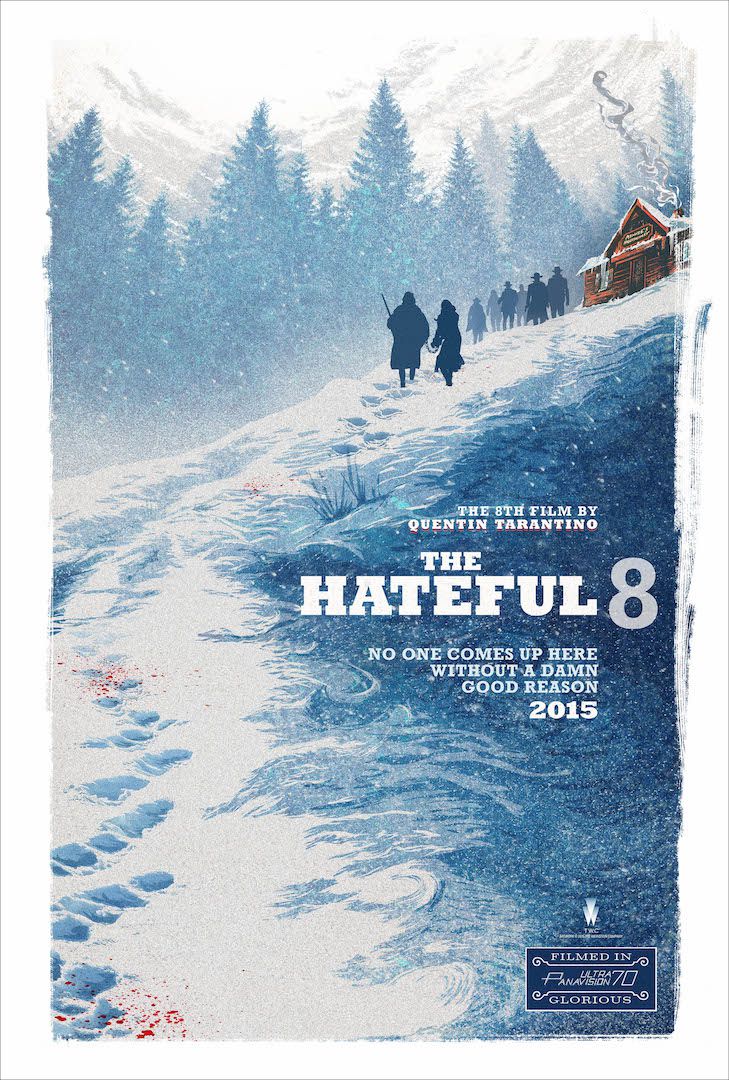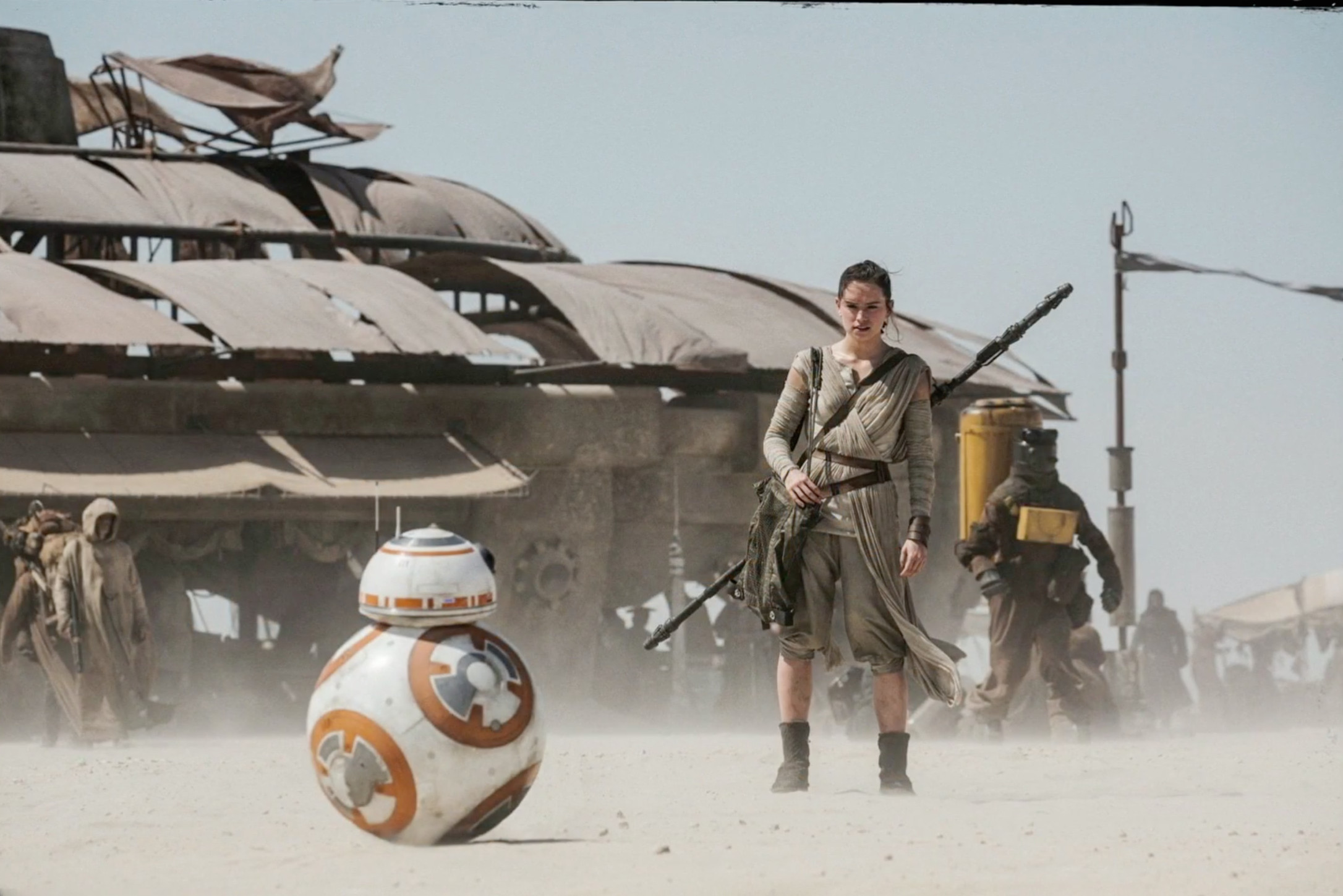Director: Quentin Tarantino
I put on my movie geek hat and took in the limited "Roadshow" special release of this movie. More on that after the actual review.
The Hateful Eight evoked a reaction in me similar to those I had to Tarantino's previous two films, Inglorious Basterds and Django Unchained. It's a movie that shows outstanding technical skills and acting, along with Tarantino's distinctively energetic and sly dialogue. That said, also like the previous two movies, The Hateful Eight does not quite stack up against its director's earliest and most beloved movies.
The setup and story are strong. Roughly 10 to 20 years after the U.S. Civil War, the grizzled bounty hunter John "The Hangman" Ruth (Kurt Russell) is transporting the prisoner Daisy Domergue (Jennifer Jason Leigh) to a small town in Wyoming to face justice. To seek shelter from an impending blizzard, Ruth heads for Minnie's Habberdashery, a small isolated store where the two can wait out the storm. On the road to the Habberdashery and at the shop itself, Ruth and Domergue find themselves among several other men of strange or mysterious backgrounds. The wary Ruth is highly suspicious of all of them, as Domergue's bounty is a staggering $10,000. Ruth must deal with the reality that he and his captive must spend a few days among seven men, any one or several of whom could be looking to kill Ruth and free Domergue.
Many will find the first 90 or so minutes of the movie slow, as they rely heavily on dialogue to reveal the tale and the characters involved. I actually found the carefully-measured buildup to be brilliant. The intrigue of learning just who each colorful character is and what their possible motivations may be is the stuff of highly skilled writing. This is where Tarantino's ability with characters, pacing, and dialogue are at their sharpest. There are plenty of built-in tensions between figures who dislike and mistrust each other immediately, whether due to racism, greed, or assumptions based on hearsay. From the moment Ruth and Domergue come across their first stranger, we viewers are just waiting for any one of the several shady and dangerous men to tip his hand or unleash hell. This growing sense of possible mayhem carries much of the first half of the movie.
Of course, things become "Tarantino" during the final few Chapters (there are six, in all). If you're not sure what this means, then there's no use in my explaining. Suffice it to say that things go completely haywire. With abandon. In all honesty, I found these final sections of the movie less interesting than the buildup. They are masterfully executed (pun intended), and Tarantino once again exhibits his adeptness with intense action scenes. However, anyone familiar with his movies can hardly find the resolution very surprising or particularly creative. There are also a few meanderings in the dialogue and narrative that dull some of the film's power in a few places.
During this initial week or two or release, The Hateful Eight is only being shown in select theaters in a special "Roadshow" style. This entails being shown on a "super wide screen" format - a 70mm camera only used long ago for a few massive epics such as Lawrence of Arabia. This presentation also includes an old-school musical overture to start the picture, as well as a 10-minute intermission. There are also the added bonuses of zero previews and a nice little commemorative booklet. It was certainly fun to take part in something like this, but it is hardly imperative for most movie-goers.
However you choose to see it, The Hateful Eight is one that will certainly please fans of Tarantino. I doubt that it will change anyone's opinion of him, either way, as a filmmaker, but it is another strong effort by one of the United States's most singular talents.
Overall Thoughts on Tarantino's Filmography
Watching The Hateful Eight had me reminiscing on my relationship with Tarantino's movies. I did a much longer post on Pulp Fiction several years ago, including brief thoughts on every film that Tarantino has either written or directed. My general feelings remain the same. What used to be my borderline-obsession for the man's movies has cooled to a measured appreciation and curiosity, with a dash of over-familiarity.
Tarantino is still sticking with what he knows and loves: hard-boiled characters, Westerns, and insanely bloody action. I can't fault him for staying well within his comfort zone, as it's led him to create some excellent movies. That said, I still cannot shake the feeling that he is capable of more. The main source of this opinion is the movie Jackie Brown, which is easily Tarantino's most understated (and underrated) movie. Yes, it involves criminals and cool customers, right in keeping with every film he has made. However, Jackie Brown showed that Tarantino is more than capable of telling a much more realistic tale about characters who feel much more human than the more mythic or comic book-ish figures which populate nearly all of his films. That movie showed that Tarantino does not need to rely on massive bloodletting, over-the-top characters, or completely outlandish scenarios to create a great movie.
Do not misunderstand me. I am not asking to see Tarantino do a rom-com or a sentimental biopic, just as I wouldn't ask for a hip, stylish, and ultra-violent crime movie from Ron Howard. I just think that he has the capacity to tread a few cinematic paths that veer away from those that he has already tread so thoroughly. He is still a relatively young director, so I do have hope to someday see what else he can create.
The Hateful Eight evoked a reaction in me similar to those I had to Tarantino's previous two films, Inglorious Basterds and Django Unchained. It's a movie that shows outstanding technical skills and acting, along with Tarantino's distinctively energetic and sly dialogue. That said, also like the previous two movies, The Hateful Eight does not quite stack up against its director's earliest and most beloved movies.
The setup and story are strong. Roughly 10 to 20 years after the U.S. Civil War, the grizzled bounty hunter John "The Hangman" Ruth (Kurt Russell) is transporting the prisoner Daisy Domergue (Jennifer Jason Leigh) to a small town in Wyoming to face justice. To seek shelter from an impending blizzard, Ruth heads for Minnie's Habberdashery, a small isolated store where the two can wait out the storm. On the road to the Habberdashery and at the shop itself, Ruth and Domergue find themselves among several other men of strange or mysterious backgrounds. The wary Ruth is highly suspicious of all of them, as Domergue's bounty is a staggering $10,000. Ruth must deal with the reality that he and his captive must spend a few days among seven men, any one or several of whom could be looking to kill Ruth and free Domergue.
Many will find the first 90 or so minutes of the movie slow, as they rely heavily on dialogue to reveal the tale and the characters involved. I actually found the carefully-measured buildup to be brilliant. The intrigue of learning just who each colorful character is and what their possible motivations may be is the stuff of highly skilled writing. This is where Tarantino's ability with characters, pacing, and dialogue are at their sharpest. There are plenty of built-in tensions between figures who dislike and mistrust each other immediately, whether due to racism, greed, or assumptions based on hearsay. From the moment Ruth and Domergue come across their first stranger, we viewers are just waiting for any one of the several shady and dangerous men to tip his hand or unleash hell. This growing sense of possible mayhem carries much of the first half of the movie.
Of course, things become "Tarantino" during the final few Chapters (there are six, in all). If you're not sure what this means, then there's no use in my explaining. Suffice it to say that things go completely haywire. With abandon. In all honesty, I found these final sections of the movie less interesting than the buildup. They are masterfully executed (pun intended), and Tarantino once again exhibits his adeptness with intense action scenes. However, anyone familiar with his movies can hardly find the resolution very surprising or particularly creative. There are also a few meanderings in the dialogue and narrative that dull some of the film's power in a few places.
During this initial week or two or release, The Hateful Eight is only being shown in select theaters in a special "Roadshow" style. This entails being shown on a "super wide screen" format - a 70mm camera only used long ago for a few massive epics such as Lawrence of Arabia. This presentation also includes an old-school musical overture to start the picture, as well as a 10-minute intermission. There are also the added bonuses of zero previews and a nice little commemorative booklet. It was certainly fun to take part in something like this, but it is hardly imperative for most movie-goers.
However you choose to see it, The Hateful Eight is one that will certainly please fans of Tarantino. I doubt that it will change anyone's opinion of him, either way, as a filmmaker, but it is another strong effort by one of the United States's most singular talents.
Overall Thoughts on Tarantino's Filmography
Watching The Hateful Eight had me reminiscing on my relationship with Tarantino's movies. I did a much longer post on Pulp Fiction several years ago, including brief thoughts on every film that Tarantino has either written or directed. My general feelings remain the same. What used to be my borderline-obsession for the man's movies has cooled to a measured appreciation and curiosity, with a dash of over-familiarity.
Tarantino is still sticking with what he knows and loves: hard-boiled characters, Westerns, and insanely bloody action. I can't fault him for staying well within his comfort zone, as it's led him to create some excellent movies. That said, I still cannot shake the feeling that he is capable of more. The main source of this opinion is the movie Jackie Brown, which is easily Tarantino's most understated (and underrated) movie. Yes, it involves criminals and cool customers, right in keeping with every film he has made. However, Jackie Brown showed that Tarantino is more than capable of telling a much more realistic tale about characters who feel much more human than the more mythic or comic book-ish figures which populate nearly all of his films. That movie showed that Tarantino does not need to rely on massive bloodletting, over-the-top characters, or completely outlandish scenarios to create a great movie.
Do not misunderstand me. I am not asking to see Tarantino do a rom-com or a sentimental biopic, just as I wouldn't ask for a hip, stylish, and ultra-violent crime movie from Ron Howard. I just think that he has the capacity to tread a few cinematic paths that veer away from those that he has already tread so thoroughly. He is still a relatively young director, so I do have hope to someday see what else he can create.






